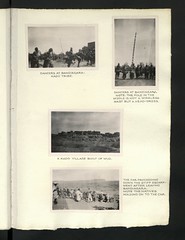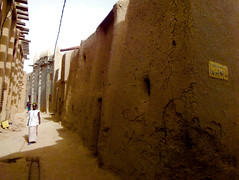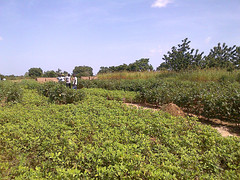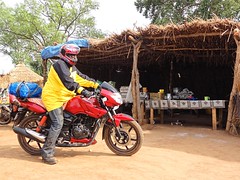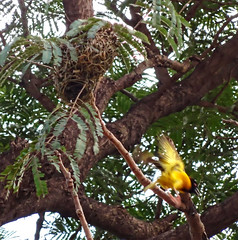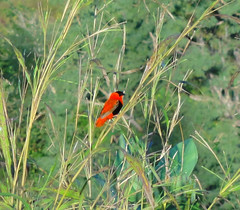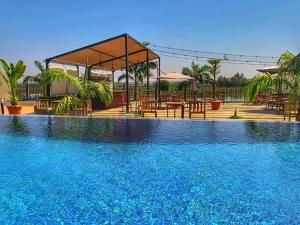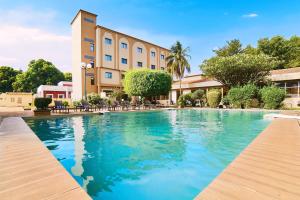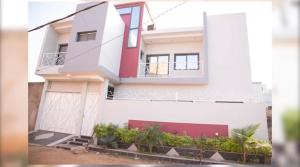 Mali
Mali
Mali (English: /ˈmli/; French: [mali]), officially the Republic of Mali, is a landlocked country in West Africa. Mali is the eighth-largest country in Africa, with an area of over . The population of Mali is million. 67% of its population was estimated to be under the age of 25 in 2017. Its capital and largest city is Bamako. The sovereign state of Mali consists of ten regions and its borders on the north reach deep into the middle of the Sahara Desert. The country's southern part is in the Sudanian savanna, where the majority of inhabitants live, and both the Niger and Senegal rivers pass through. The country's economy centres on agriculture and mining. One of Mali's most prominent natural resources is gold, and the country is the third largest producer of gold on the African continent. It also exports salt.
Present-day Mali was once part of three extremely powerful and wealthy West African empires that controlled trans-Saharan trade: the Ghana Empire (for which Ghana is named), the Mali Empire (for which Mali is named), and the Songhai Empire. At its peak in 1300, the Mali Empire was the wealthiest country in Africa, covering an area about twice the size of modern-day France and stretched to the west coast of the continent. Mali was also one of the wealthiest countries on earth, and its emperor at its zenith, Mansa Musa, is believed to be possibly the wealthiest individual in history. Besides being an economic powerhouse, medieval Mali was a centre of Islam, culture and knowledge, with Timbuktu becoming a renowned place of learning with its university, one of the oldest in the world still active. The expanding Songhai Empire absorbed the empire in 1468, followed by a Saadian army which defeated the Songhai in 1591. In the late 19th century, during the Scramble for Africa, France seized control of Mali, making it a part of French Sudan. French Sudan (then known as the Sudanese Republic) joined with Senegal in 1959, achieving independence in 1960 as the Mali Federation. Shortly thereafter, following Senegal's withdrawal from the federation, the Sudanese Republic declared itself the independent Republic of Mali. After a long period of one-party rule, a coup in 1991 led to the writing of a new constitution and the establishment of Mali as a democratic, multi-party state.
In January 2012, an armed conflict broke out in northern Mali, in which Tuareg rebels took control of a territory in the north, and in April declared the secession of a new state, Azawad. The conflict was complicated by a military coup that took place in March and later fighting between Tuareg and other rebel factions. In response to territorial gains, the French military launched Operation Serval in January 2013. A month later, Malian and French forces recaptured most of the north, although the conflict still continued. Presidential elections were held on 28 July 2013, with a second-round run-off held on 11 August, and legislative elections were held on 24 November and 15 December 2013.
In the early 2020s Mali experienced two military takeovers by Assimi Goïta.
Etymology
The name Mali is taken from the name of the Mali Empire. The name means "the place where the king lives" and carries a connotation of strength.
Guinean writer Djibril Niane suggests in Sundiata: An Epic of Old Mali (1965) that it is not impossible that Mali was the name given to one of the capitals of the emperors. 14th-century Maghrebi traveller Ibn Battuta reported that the capital of the Mali Empire was called Mali. One Mandinka tradition tells that the legendary first emperor Sundiata Keita changed himself into a hippopotamus upon his death in the Sankarani River and that it's possible to find villages in the area of this river, termed "old Mali", which have Mali for a name. A study of Malian proverbs noted that in old Mali, there is a village called Malikoma, which means "New Mali", and that Mali could have formerly been the name of a city.
Another theory suggests that Mali is a Fulani pronunciation of the name of the Mande peoples. It is suggested that a sound shift led to the change, whereby in Fulani the alveolar segment /nd/ shifts to /l/ and the terminal vowel denasalizes and raises, leading "Manden" to shift to /mali/.
History
Rock paintings and carvings indicate that northern Mali has been inhabited since prehistoric times when the Sahara was fertile grassland. Farming took place by 5000 BC and iron was used around 500 BC.
The rock art in the Sahara suggests that northern Mali has been inhabited since 10,000 BC, when the Sahara was fertile and rich in wildlife. Early ceramics have been discovered at the central Malian site of Ounjougou dating to about 9,400 BC, and are believed to represent an instance of the independent invention of pottery in the region.
In the first millennium BC, early cities and towns were created by Mande peoples related to the Soninke people, along the middle Niger River in central Mali, including Dia which began from around 900 BC, and reached its peak around 600 BC, and Djenne-Djenno, which lasted from around 300 BC to 900 AD. By the sixth century AD, the lucrative trans-Saharan trade in gold, salt and slaves had begun, facilitating the rise of West Africa's great empires.
There are a few references to Mali in early Islamic literature. Among these are references to "Pene" and "Malal" in the work of al-Bakri in 1068, the story of the conversion of an early ruler, known to Ibn Khaldun (by 1397) as Barmandana, and a few geographical details in the work of al-Idrisi.
Mali was once part of three famed West African empires which controlled trans-Saharan trade in gold, salt, other precious commodities, and slaves majorly during the reign of Mansa Musa from c. 1312 – c. 1337. These Sahelian kingdoms had neither rigid geopolitical boundaries nor rigid ethnic identities. The earliest of these empires was the Ghana Empire, which was dominated by the Soninke, a Mande-speaking people. The empire expanded throughout West Africa from the eighth century until 1078, when it was conquered by the Almoravids.
The Battle of Kirina in 1235, culminated in a victory for the Mandinka under the command of the exiled prince Sundiata Keita, which led to the downfall of the Sosso Empire.
The Mali Empire later formed on the upper Niger River, and reached the height of power in the 14th century. Under the Mali Empire, the ancient cities of Djenné and Timbuktu were centers of both trade and Islamic learning. The empire later declined as a result of internal intrigue, ultimately being supplanted by the Songhai Empire.The Songhai had long been a major power in West Africa subject to the Mali Empire's rule.
In the late 14th century, the Songhai gradually gained independence from the Mali Empire and expanded, ultimately subsuming the entire eastern portion of the Mali Empire. The Songhai Empire's eventual collapse was largely the result of a Saadian in 1591, under the command of Judar Pasha. The fall of the Songhai Empire marked the end of the region's role as a trading crossroads. Following the establishment of sea routes by the European powers, the trans-Saharan trade routes lost significance. At that time, the Mali Empire's abundance in wealth expanded its commercial assets of salt and gold.
One of the worst famines in the region's recorded history occurred in the 18th century. According to John Iliffe, "The worst crises were in the 1680s, when famine extended from the Senegambian coast to the Upper Nile and 'many sold themselves for slaves, only to get a sustenance', and especially in 1738–1756, when West Africa's greatest recorded subsistence crisis, due to drought and locusts, reportedly killed half the population of Timbuktu."
French colonial rule
Mali fell under the control of France during the late 19th century. By 1905, most of the area was under firm French control as a part of French Sudan. On 24 November 1958, French Sudan (which changed its name to the Sudanese Republic) became an autonomous republic within the French Community. In January 1959, Mali and Senegal united to become the Mali Federation. The Mali Federation gained independence from France on 20 June 1960.
Senegal withdrew from the federation in August 1960, which allowed the Sudanese Republic to become the independent Republic of Mali on 22 September 1960, and that date is now the country's Independence Day. Modibo Keïta was elected the first president. Keïta quickly established a one-party state, adopted an independent African and socialist orientation with close ties to the East, and implemented extensive nationalization of economic resources. In 1960, the population of Mali was reported to be about 4.1 million.
Moussa Traoré
On 19 November 1968, following progressive economic decline, the Keïta regime was overthrown in a bloodless military coup led by Moussa Traoré, a day which is now commemorated as Liberation Day. The subsequent military-led regime, with Traoré as president, attempted to reform the economy. His efforts were frustrated by political turmoil and a devastating drought between 1968 and 1974, in which famine killed thousands of people. The Traoré regime faced student unrest beginning in the late 1970s and three coup attempts. The Traoré regime repressed all dissenters until the late 1980s.
The government continued to attempt economic reforms, and the populace became increasingly dissatisfied. In response to growing demands for multi-party democracy, the Traoré regime allowed some limited political liberalization. They refused to usher in a full-fledged democratic system. In 1990, cohesive opposition movements began to emerge, and was complicated by the turbulent rise of ethnic violence in the north following the return of many Tuaregs to Mali.
Anti-government protests in 1991 led to a coup, a transitional government, and a new constitution. Opposition to the corrupt and dictatorial regime of General Moussa Traoré grew during the 1980s. During this time strict programs, imposed to satisfy demands…
Hotels Mali
Looking for places related to Mali?
Those are other destinations to find places related to Mali:

